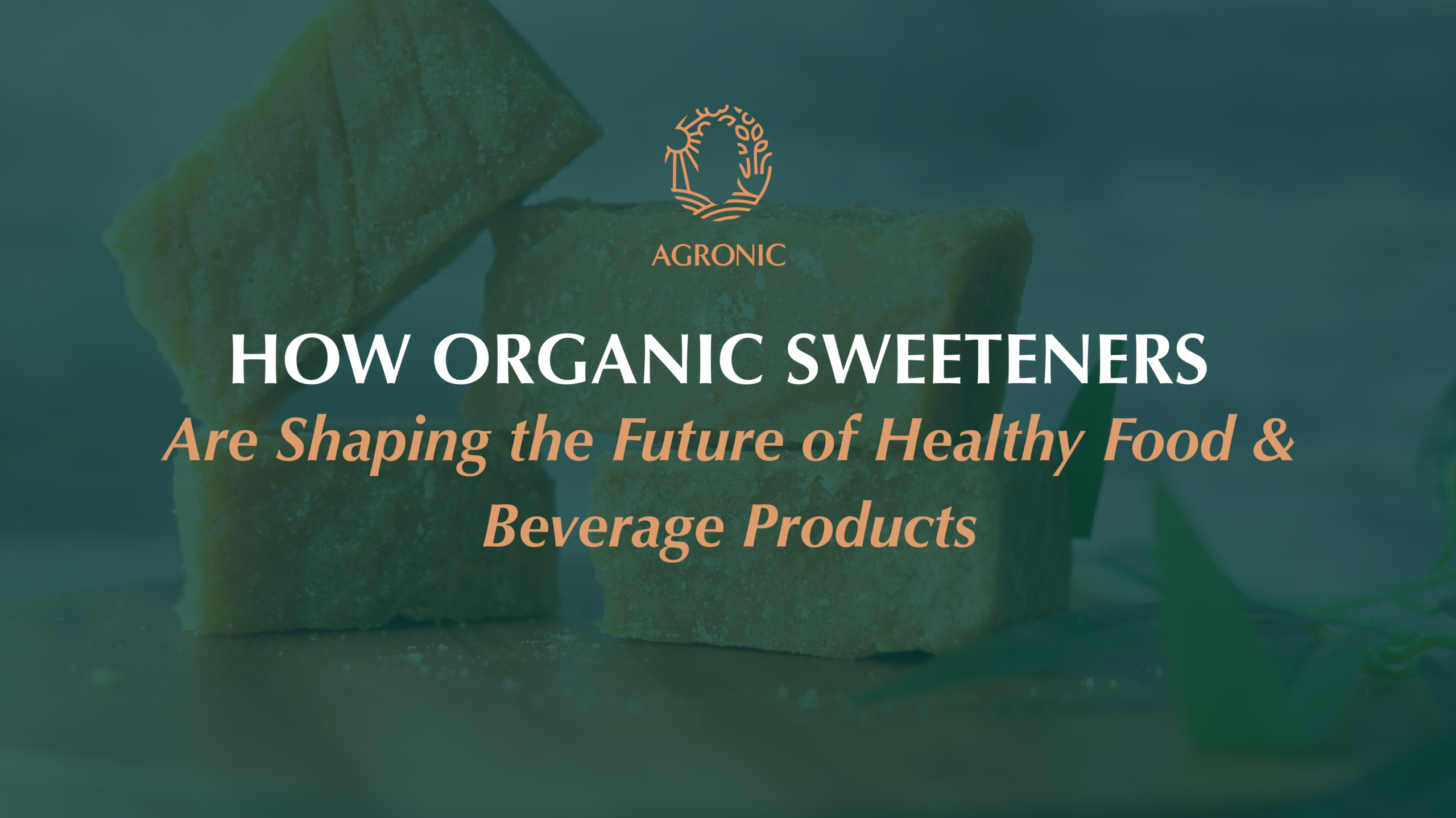How Organic Sweeteners Are Shaping the Future of Healthy Food & Beverage Products

More people are rethinking the sugar they use every day. With growing concerns about the health risks of refined sugar, there is a strong move toward cleaner, natural choices. Today’s consumers want sweeteners that add taste without chemicals or heavy processing.
Organic sweeteners are leading this change. Options like organic jaggery, coconut sugar, stevia, and rice syrup offer natural sweetness with better nutrition and no synthetic additives. They fit perfectly into clean-label and health-focused foods and drinks.
This shift isn’t just a trend. It reflects a global push for honest ingredients and safer food. As more brands innovate with clean labels, organic sweeteners are becoming the preferred choice for a sweeter, healthier future.
What Defines an Organic Sweetener
Organic sweeteners come from crops grown without chemical fertilizers, pesticides, or GMOs. They are lightly processed, so they keep more natural taste and minerals. Unlike regular sweeteners, they are not bleached or mixed with artificial flavors or preservatives.
These sweeteners must meet strict rules to be called organic. Certifications such as USDA Organic, EU Organic, and NPOP prove they are pure, traceable, and made through clean farming and safe processing.
There are many types of organic sweeteners. Organic jaggery has a rich, caramel taste and natural minerals. Organic coconut sugar has a low glycemic index and a warm, earthy flavor. Organic cane sugar is mild and works well in baking and daily use. Organic rice or malt syrup offers a gentle sweetness for drinks, baby foods, and packaged products. These clean-label choices help brands move away from refined sugar while keeping flavor and nutrition intact.
Health and Functional Advantages of Organic Sweeteners
Organic sweeteners are cleaner and safer because they come from crops grown without chemicals. They are less processed, so they keep more natural minerals and plant nutrients that refined sugar loses.
They offer a balanced sweetness that is easier for the body to digest. Because they break down more slowly, they help maintain steady energy instead of causing sharp sugar spikes. This makes them a better option for snacks, drinks, and everyday foods.
Organic sweeteners also fit well into vegan, gluten-free, and clean-label products. They do not contain additives, preservatives, or artificial colors, so they blend easily into healthy recipes. From bakery products to baby foods, they help brands create natural products that taste good and stay true to clean-label standards.
Applications Across Food and Beverage Manufacturing
Organic sweeteners are now common in bakery items, drinks, confectionery, health foods, and natural snacks. They work as clean sugar alternatives and also improve the product’s quality. In baked goods, they help with browning and add a rich, natural flavor. In beverages, they dissolve easily and give a smooth, mild sweetness. In nutrition bars and snacks, they act as natural binders and improve texture without additives.
Because they are stable, versatile, and chemical-free, they fit well in clean-label products. Global manufacturers choose organic-certified sweeteners because they are traceable, safe, and grown without harmful chemicals. This makes it easier for brands to offer trusted, natural, and premium food products that meet today’s consumer expectations.
Agronic Food’s Commitment to Supplying Pure Organic Sweeteners
At Agronic Food, we source organic sweeteners directly from certified farms that follow strict organic standards. Every batch is fully traceable, ensuring clean cultivation without synthetic chemicals or GMOs. Our processing methods are sustainable and designed to preserve natural nutrients and flavor while reducing environmental impact.
We use eco-friendly packaging and maintain strict quality control across production, storage, and export. This helps global partners receive pure, consistent, and safe ingredients for their clean-label formulations. With reliable bulk supply, global certifications, and transparent sourcing, Agronic Food supports brands, wholesalers, and private labels looking for trusted organic sweeteners for today’s natural food market.
Supporting a Cleaner and More Sustainable Future
Organic sweeteners do more than replace refined sugar. They support farming that avoids chemicals, protects soil, and keeps water clean. This helps preserve biodiversity and reduces long-term harm to the planet.
Clean-label products made with organic ingredients give brands a way to offer safer and more trusted foods. They meet global demand for natural products without artificial additives.
Agronic Food supports this change with certified organic sweeteners sourced responsibly from organic farms. We invite food makers, wholesalers, and private labels to partner with us. Together, we can build cleaner products and a sustainable future for the industry.
Conclusion
Organic sweeteners are reshaping how the world thinks about sweetness. They offer more than flavor—they bring purity, nutrients, and natural functionality that refined sugar cannot match. By choosing options like organic jaggery, coconut sugar, cane sugar, and organic syrups, brands can move toward cleaner labels and healthier products without compromising taste or performance.
At Agronic Food, we help manufacturers and private label brands make this shift smoothly. With certified sourcing, traceable supply chains, and consistent quality, we provide organic sweeteners that support innovation, sustainability, and long-term market trust. Partnering with us means building products that are natural, safe, and ready for the future of food.
Frequently Asked Questions (FAQs)
1. What makes organic sweeteners different from refined sugar?
Organic sweeteners are sourced from crops grown without synthetic pesticides or fertilizers. They undergo minimal processing and retain more natural minerals and nutrients. In contrast, refined sugar is heavily processed, bleached, and may contain chemical residues.
2. Are organic sweeteners healthier than regular sugar?
Yes. Organic sweeteners often contain trace minerals, antioxidants, and balanced sweetness that digests more slowly. This helps reduce energy spikes and provides a cleaner option for everyday consumption.
3. Can organic sweeteners be used in large-scale food manufacturing?
Absolutely. Organic sweeteners work well in bakery products, beverages, snacks, confectionery, baby food, and health foods. They improve flavor, texture, and stability without the need for artificial additives.

